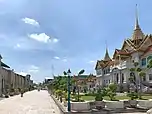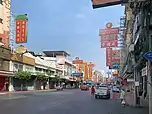COVID-19 pandemic in Thailand
The COVID-19 pandemic in Thailand is part of the worldwide pandemic of coronavirus disease 2019 (COVID-19) caused by severe acute respiratory syndrome coronavirus 2 (SARS-CoV-2). The first known case of the virus arrived on 8 January 2020 and was confirmed to have reached Thailand on 13 January, when the country made the first confirmation of a case outside China. The first reported local transmission was confirmed on 31 January.
| COVID-19 pandemic in Thailand | |
|---|---|
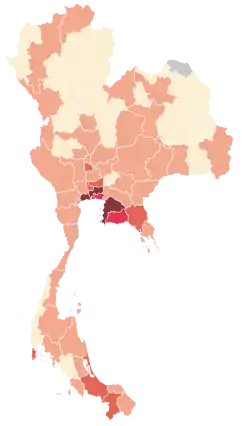 Map of provinces with confirmed coronavirus cases (as of 4 January)
Confirmed 1–9 Confirmed 10–99 Confirmed 100–499 Confirmed 500–999 Confirmed 1,000–9,999 | |
| Disease | COVID-19 |
| Virus strain | SARS-CoV-2 |
| Location | Thailand |
| First outbreak | Wuhan, Hubei, China |
| Index case | Bangkok |
| Arrival date | 8 January 2020 (confirmed 12 January) (1 year and 1 month) |
| Confirmed cases | 23,557[1][2] |
| Active cases | 6,068[1][2] |
| Suspected cases‡ | 1,017,972 |
| Severe cases | 22 |
| Recovered | 17,410[1][2] |
Deaths | 79[1][2] |
| Fatality rate | 0.34% |
| Government website | |
| ddc | |
| ‡Suspected cases have not been confirmed by laboratory tests as being due to this strain, although some other strains may have been ruled out. | |
The number of cases remained low throughout February, reaching 40 by the end of the month, but surged in mid-March, soon rising to over a hundred per day. Public venues and businesses were ordered to close in Bangkok and several other provinces. Prime Minister Prayut Chan-o-cha declared a state of emergency, effective on 26 March, and a curfew went into effect on 3 April. All commercial international flights were suspended from 4 April, and lockdown measures were implemented in varying degrees throughout the country. The rate of new cases gradually dropped throughout April, and by mid-May, locally transmitted infection rates had fallen to near-zero, and easing of restrictions was gradually implemented.
The public has cooperated relatively well with health advisories, and the country's robust public health infrastructure has been credited as a contributing factor to its relatively successful response to date.[3][4] The curfew was lifted in July and academia was reopened in August. However, the state of emergency remained in effect. In December, a surge in Samut Sakhon, just southwest of Bangkok, increased the country's total confirmed cases by at least 20%, including the country's single-day high of 576 cases.
The government response was initially based on surveillance and contact tracing. Temperature and symptom screening for coronavirus testing was implemented at international airports and hospitals.[5] The government failed to prevent shortages of surgical masks, and became a scandal over perceived corruption and siphoning of supplies by some cabinet members.[6][7][8] Criticism was also aimed at the government's inconsistent policy over international travel and quarantine requirements, indecisiveness and slowness to act, and poor communication where many official announcements were quickly retracted or contradicted by other government units.[9][10] Travel restrictions were not announced until 5 March, when travellers incoming from "disease-infected zones" were subject to quarantine.[11] The establishment of the Centre for COVID-19 Situation Administration (CCSA)[lower-alpha 1] was to create the central response centre, with all public communications directed through its spokesperson Taweesin Visanuyothin.[12]
The pandemic has heavily disrupted the country's economy, of which tourism is a significant sector. The International Monetary Fund has predicted Thailand's GDP to shrink by 6.7 percent in 2020, a revision from a previous estimated 2.5% increase.[13] The government has borrowed and announced several assistance measures, including cash handouts to those affected and a 1.9 trillion-baht (US$60 billion) stimulus package, though few people have actually received it.[14] Dissatisfaction to its economic impact and government response contributed to the second wave of 2020 Thai protests starting from 18 July 2020.
Background
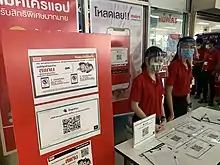
On 12 January, the World Health Organization (WHO) confirmed that a novel coronavirus was the cause of a respiratory illness in a cluster of people in Wuhan City, Hubei Province, China, who had initially come to the attention of the WHO on 31 December 2019.[15][16]
Unlike SARS of 2003, the case fatality ratio for COVID-19 [17][18] has been much lower, but the transmission has been significantly greater, with a significant total death toll.[19][17]
Timeline
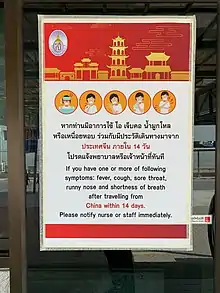
On 13 January, the Ministry of Public Health announced the first confirmed case, a 61-year-old Chinese woman who is a resident of Wuhan. She arrived at Suvarnabhumi Airport in Bangkok on 8 January, where she was detected using thermal surveillance and then hospitalised.[20][21][22] Thailand's second case occurred in a 74-year-old Chinese woman who arrived in Bangkok on a flight from Wuhan on 13 January.[23][24] Several more cases were detected in arrivals from China throughout January.
On 31 January, an additional five cases were reported, bringing the cumulative number of confirmed cases to 19. One was a local taxi driver who had no records of travelling to China and was thus suspected to have been infected by a Chinese tourist he picked up, making this the first case of human-to-human virus transmission within the country.[25] The other cases were Chinese nationals.[26][27] The number of cases remained low throughout February, totaling to 40 confirmed by the end of the month.
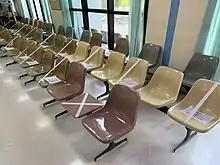
On 1 March, MOPH reported the first confirmed death in Thailand. The number of cases surged around mid-March, with 89 new cases reported on 21 March, the largest single-day rise since the virus reached the country.[28][29] The outbreak was traced to several transmission clusters, the largest of which occurred at a Muay Thai fight at the military-run Lumpinee Boxing Stadium on 6 March.[30] Confirmed cases rose to over a hundred per day over the following week, and public venues and businesses were ordered to close in Bangkok and several other provinces.[31] The abrupt closure of Bangkok businesses prompted tens of thousands of workers to travel to their hometowns.[32] Prime Minister Prayut Chan-o-cha declared a state of emergency, effective on 26 March,[33] and a curfew went into effect on 3 April.[34] All commercial international flights were suspended from 4 April, and lockdown measures were implemented in varying degrees throughout the country.
The rate of new cases gradually dropped throughout April, and by mid-May, locally transmitted infection rates had fallen to near-zero, and easing of restrictions was gradually implemented.[35][36] The curfew was lifted in July and academia began rereopening in August.
On 15 July, the national centre for COVID-19 has announced two new infected cases; an Egyptian soldier in Rayong Province, and a Sudanese diplomat's daughter in Asok neighbourhood of Bangkok. Both of them were the government's exceptions for "VIP guests," not requiring to comply with several COVID-19 measures.[37] Many criticised the government's failure to contain the disease from those VIPs.[38]
Even though there had been no new domestic cases since mid-May, on 21 August, the CCSA announced that it decided to extend the Emergency Degree until 30 September, claiming that it was necessary to use its power to prevent incoming aliens from overseas in many routes, and that Thai people' daily lives were not affected, since CCSI had already loosen its restriction on activities such as academia reopen.[39] International rights groups have criticized the emergency decree being employed to suppress free speech.[40]
In September, a prison inmate who had not been abroad was Thailand's first locally transmitted case in 100 days. Another domestic case was detected on 7 November, though neither cases were not traced to any further outbreaks.
In October, foreign tourists entered Thailand for the first time in seven months under the Special Tourist Visa program.[41] A total of 1,201 vistiors arrived in the month, compared to 3.07 million in the same month a year earlier.[42] A French tourist on Ko Samui in Surat Thani contracted the disease after passing the 14-day state quarantine. She developed a fever 17 days after arriving in the country.[43] In November, the government extended the coronavirus emergency decree for the eighth time, approving a 45-day extension until 15 January 2021.[44]
Starting at the end of November, at least ten cases were detected in women who had illegally crossed the Myanmar border into Mae Sai District from Tachileik. They made long-distance travels, including by bus and by air, and some attended large gatherings, prompting authorities to impose quarantine on people who may have come into close contact with them.[45][46]
In mid-December, an outbreak occurred in Samut Sakhon, just southwest of Bangkok, increasing the country's total confirmed cases by at least 20%.[47] Cases in the province, which is the center of the country's fishing industry, primarily impacted migrant workers from Myanmar,[47] a major source of labour in the seafood industry.[48] Over 1,300 cases were traced to a seafood market in Samut Sakhon, as cases were detected in 27 provinces.[49] Before the surge, Thailand had recorded about 4,300 COVID-19 cases and just 60 deaths, while Myanmar had registered about 117,000 cases.[48] The 576 cases reported on 20 December was Thailand's biggest daily increase and caused the nation's overall total to climb 13%.[50] A new cluster emerged in Rayong, linked to a gambling den. On 28 December, a worker at the den died, Thailand's first COVID-19 death in nearly two months.[51][52]
With the clusters starting to spread into Bangkok, the Bangkok Metropolitan Administration announced that the city would close schools and daycare centres 4–17 January 2021.[53] Soon after, the Ministry of Education ordered all schools closed for the month of January.[54]
Preventive measures
International travel restrictions
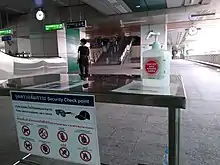
The screening of passengers arriving from China is ongoing at six airports, beginning on 3 January: Suvarnabhumi Airport, Don Mueang International Airport, Phuket International Airport, Chiang Mai International Airport and Krabi International Airport, with the addition of Chiang Rai International Airport since 24 January. A number of suspected cases have been found to have other common respiratory conditions.[55][56][5]
On 11 February, the Holland America Line-operated MS Westerdam was refused permission to dock at Laem Chabang port by the country's Marine Department.[57] The ship was previously denied entry to the Philippines, Japan, South Korea, and Guam due to similar fears.[58]
On 13 February, two cruise ships, the MV Seabourn Ovation anchored at the Phuket Deep Sea Port and the Quantum of the Seas docked at Phuket's Patong pier. Unlike the MS Westerdam, the two ships were allowed because both had planned to make their first stop in Thailand and would depart to Singapore afterwards. The passengers on board were screened by public health officials before being given permission to step ashore.[59][60]
On 17 February, a meeting between Ministry of Foreign Affairs, Ministry of Public Health, AOT and the Immigration Bureau came to the conclusion to disallow entry of all foreigners from MS Westerdam to the country after an American woman tested positive for COVID-19 in Malaysia. The number of passengers who entered Thailand before the ban was 95, 91 were transferred to connecting flights and had already left the country.[61][62]
On 18 February, the health authorities had extended COVID-19 screening to cover visitors from Japan and Singapore. Passengers from these countries were treated with the same method as passengers on flights from Mainland China. The Ministry of Public Health also raised measures against COVID-19 to level 3 in preparation for a surge in transmission. Every province must have at least one hospital capable of testing for COVID-19. The Department of Medical Sciences is currently developing a virus test kit that will deliver a result in five minutes, which is planned to be available within two months.[63]
On 21 February, the Ministry of Public Health announced a new screening criteria, with additional surveillance for visitors from Hong Kong, Macau, South Korea and Taiwan. People developing pneumonia due to unknown causes and living in eight provinces that were popular among Chinese tourists including Bangkok, Chiang Mai, Chiang Rai, Chon Buri, Krabi, Phuket, Prachuap Khiri Khan and Samut Prakan, would be automatically considered as COVID-19 suspected cases.[64]
Further restrictions were announced on 19 March, requiring medical certification for international arrivals, and also health insurance for foreigners.[65][66]
On 3 April, the Civil Aviation Authority of Thailand ordered that there would be a ban on all passengers flights landing in Thailand from the morning of 4 April to the evening of the 6 April.[67] On the evening of 6 April, the flight ban was further extended to 18 April, and now to 30 April.[68]
Restrictions on travellers from risk areas
As of 22 March, the Ministry of Public Health defined two types of risk areas:[69]
Dangerous Disease Infected Zones
The Civil Aviation Authority of Thailand (CAAT) is requiring travellers from all countries to show medical certificates prior to boarding their flights to Thailand and after arriving in Thailand when entering immigration checkpoints or their journey will not be allowed. Also, the traveller must seek quarantine in government-managed places for 14 days with no exception.[70]
Medical supply regulations

On 4 February, the government announced that four products, namely surgical masks, polypropylene, alcohol-based hand sanitisers and toilet paper, are to be designated as controlled goods under the Price of Goods and Services Act, B.E. 2542 (1999) following a cabinet resolution.[71]
On 6 February, Prime Minister Prayut Chan-o-cha warned that the stockpiling and price gouging of surgical masks and hand sanitisers could lead to legal consequences.[72]
On 12 March, health officials encouraged people to make face masks at home out of cloth, stating that cloth masks can prevent droplets bigger than one micron from spreading.[73]
Lockdown, curfew, and inter-provincial travel ban
On 21 March, Bangkok City Hall authorities declared a wide-ranging shutdown of various businesses. Bangkok Governor Aswin Kwanmuang disclosed after the City Hall meeting that the board had passed a resolution to close establishments under Section 35 of the Communicable Diseases Act B.E. 2558 (2015), effective for a period of 22 days from 22 March to 12 April 2020. This was then extended from 12 April 2020 to 30 April 2020.[74] Only supermarkets, pharmacies, and takeaway restaurants will be allowed to stay open at the malls.[75]
The government issued a curfew to take effect on 3 April between 10pm-4am in order to limit the spread. The government has additionally issued a travel ban for all foreigners entering Thailand.[76] Some critics of the government have been arrested for allegedly spreading false information about the coronavirus pandemic.[77][78]
The curfew was cut from 10–4 to 11–4, then 11-3 and officially ended on June 15.[79]
Tracking application
Since May, the authority adopted a tracking application named "Thai Chana" (lit. Thai wins) to track people who had entered an enclosed building, then would send a notice to anybody who were in there at the same time with a COVID-19 patient if later tested positive. However, critics questioned its benefits and there were reports of spam.
Health education
Public education focused on self-monitoring for at-risk groups, practising hygiene (especially hand washing), and avoiding crowds (or wearing masks if avoidance was not possible).[80]
Vaccine
In November 2020, the authorities ordered 26 million doses of vaccine from AstraZeneca, which reported 70% overall efficacy.[81] It requires 2 doses of vaccine per person, so the quantity ordered would only covered 13 million people.[82] Prayut cabinet later approved budget for ordering 35 million additional doses in January 2021.[83] Siam Bioscience, a company owned by King Vajiralongkorn, will received technological transfer for co-investment.[84] The authorities would also imported 2 million doses of vaccine from Sinovac, a Chinese company which Thai conglomerate Charoen Pokphand invested in,[85] during February to April 2021.[86]
Impact
Economy
(by percentage)
Sources: Asian Development Bank (ADB)[87]
Bangkok Airways announced a plan to cut their executives' salaries, reduce the number of flights, and cancel some routes; staff will be on leave without pay for 10–30 days starting from 1 March due to the economic downturn and the outbreak of COVID-19.[88]
The United Nations Industrial Development Organization released a report in June 2020 reported that 90% or more of firms expect revenue loss of more than 50% compared to last year.[89]:1 Automotive sectors had a drop in manufacturing performance index (MPI) in April 2020, about 82% year on year, showing the lowest production since 1987.[89]:2 Four other leading negatively affected sectors include petroleum and petroleum products, malts and malt beverage, air conditioning systems, and sugar.[89]:2 On the other hand, sectors which had an increase in MPI include concrete and cement, medicine, electronic circuitboard, frozen seafood, and animal feeds, of which MPI increased ranging from 10% to almost 40% year on year.[89]:2
In September 2020, World Bank forecast that Thai economy would contract 8.9% by the end of the year.[90]
Education
On 29 February, The 38th Thailand National Book Fair and 18th Bangkok International Book Fair at Impact, Muang Thong Thani were cancelled. It was instead hosted online, making it the first "online national book fair" of Thailand.[91]Chulalongkorn and Mahidol Universities, following the confirmation of COVID-19 cases among its staff and student body, began suspending classes on 16 March, while Kasetsart University took the same action as a precautionary measure.[92]
Sports
The "THAI FIGHT" boxing tournament in Chiang Rai has been postponed indefinitely due to concerns of COVID-19.[93]
On 1 March, the Football Association of Thailand decided that all Thai League professional football matches in T1, T2, T3 and T4 between 7 and 31 March will be played behind closed doors as broadcast only events.[94] However, on 4 March, the decision was changed to postpone all matches prior to 18 April indefinitely.[95]
The 2020 MotoGP Thailand Grand Prix will be postponed due to the spread of the virus. The event has been put off until the outbreak has abated.[96]
The 41st Bangkok International Motor Show, which was originally scheduled between 7 March to 5 April, has been postponed. The new schedule will be announced later.[97]
Channel 7 Boxing Stadium will continue fights behind closed doors as broadcast only events, according an official statement by the channel.[98]
Tourism
Thailand's tourist industry, which accounts for one-fifth of GDP prior to the pandemic, has been severely affected; the Tourism Authority of Thailand anticipates total tourist arrivals for 2020 to decline by as much as 65%. In the January–March period, foreign tourist arrivals fell by 38% to 6.69 million; Chinese arrivals, the largest source of inbound tourists, plunged 60% to 1.25 million.[99] With its border closed and most international flights cancelled since 4 April, tourist arrivals and spending have both dropped to zero in April, compared to 3.2 million arrivals and $4.6 billion's worth of receipts in the same month last year.[100]
Legend Siam, a theme park in Pattaya, will temporarily close from 3 March because of the lack of tourists during the spread of the virus. The park management promised to hire all staff back when it eventually reopens.[101]
On 16 March, the Ministry of Public Health announced that Songkran holidays and celebrations will be postponed until further notice as the number of cases continued to rise by 33 to 147.[102] The Songkran festival in Khaosan Road, Khon Kaen Province, Pattaya, Bang Saen Beach and Patong will not be held, according to each municipality's announcement. The dates of the holiday are to be postponed as well.[103] Ko Pha-ngan District Chief Somchai Somwong made the decision to suspend a party on Rin Beach to avoid the gathering of tourists, which could pose a risk of virus outbreak. The party had originally been scheduled on the full-moon night of 8 March.[104]
Brian Tan and Shreya Sodhani at Barclays argued that the need for quarantine would mean “the return of tourists could be relatively slow”.[105]
Xenophobia and racism
A restaurant in Chiang Mai displayed a sign which read "We apologize we are not accepting CHINESE customers. Thank you" after a customer left the restaurant upon noticing a group of Chinese people inside. The police demanded that the sign be taken down, but suggested that it could be rewritten in Chinese as "We ran out of food".[106] A similar sign was seen outside a restaurant in Ao Sane Beach in Phuket.[107]
Health minister Anutin Charnvirakul made negative comments about "dirty" Westerners, saying they "never shower" and are more likely to spread the virus than Asians.[108][109] The post attracted negative reaction in Thailand[110] and the UK[111] and was quickly removed. Mr. Charnvirakul claimed he was not responsible for it.[112]
Online hate speech against Myanmar surged after the December outbreak among migrant workers in Samut Sakhon. Prayut blamed the COVID-19 resurgence on illegal immigration.[113]
Possible spread to other countries
South Korea On 4 February, a South Korean woman, who recently visited Bangkok on a vacation, was tested positive and confirmed as the 16th case of the country[114]
Germany On 4 March, Cologne city government announced five confirmed cases, including a woman who was previously on vacation in Thailand and is believed to have been infected there.[115]
Australia On 5 March, Queensland government confirmed that an 81-year-old man who has recently returned from Thailand tested positive and was admitted to Sunshine Coast University Hospital.[116]
India On 6 March, India reported its 31st confirmed case. The patient is an Indian national who has a travel history from Thailand and Malaysia.[117]
See also
Notes
- Also titled in full as the "Centre for the Administration of the Situation due to the Outbreak of the Communicable Disease Coronavirus 2019 (COVID-19)".
References
- "COVID-19 Outbreak". Bangkok Post. Retrieved 8 February 2021.
- "ไทยรู้สู้โควิด". Twitter (in Thai). Ministry of Health (Thailand). 8 February 2021. Retrieved 8 February 2021.
- Abuza, Zachary (21 April 2020). "Explaining Successful (and Unsuccessful) COVID-19 Responses in Southeast Asia". The Diplomat. Retrieved 10 June 2020.
- Bello, Walden (3 June 2020). "How Thailand Contained COVID-19". Foreign Policy In Focus. Retrieved 10 June 2020.
- "รายงานข่าวกรณีโรคปอดอักเสบจากเชื้อไวรัสโคโรนาสายพันธุ์ใหม่ 2019 (Novel Coronavirus;2019-nCoV) ประจำวันที่ 1 กุมภาพันธ์ 2563" [Report of Novel Coronavirus (2019-nCoV) situation in Thailand, 1 February 2020] (in Thai). 1 February 2020. Retrieved 2 February 2020 – via Ministry of Public Health, Thailand.
- "'จุรินทร์'รับกำลังผลิตหน้ากากอนามัยไม่เพียงพอ" ['Churin' admits production capacity of face masks still not enough]. Daily News (in Thai). 11 February 2020. Retrieved 29 March 2020.
- "หน้ากากอนามัยไม่เพียงพอ สธ.แนะคนไม่ป่วยให้ใส่หน้ากากผ้า" [In face of mask shortage, MOPH advises the healthy to wear cloth masks]. Workpoint News (in Thai). 5 March 2020. Retrieved 29 March 2020.
- Rojanaphruk, Pravit (9 March 2020). "Minister's Aide Accused of Hoarding, Selling Millions of Masks to China". Khaosod English. Retrieved 29 March 2020.
- "คนไทยในต่างแดนฟ้องศาลปกครองสั่งยกเลิกใบ Fit to Fly" [Thais living abroad file petition with Administrative Court to rescind fit-to-fly order]. BBC Thai (in Thai). 27 March 2020. Retrieved 29 March 2020.
- "มึน กทม. "ยกเลิกข่าว" ปิดห้าง22วัน" [Confusion ensues as Bangkok authorities "cancel" news release of 22-day mall shutdown]. Thansettakij (in Thai). 21 March 2020. Retrieved 29 March 2020.
- "4 ประเทศกลุ่มเสี่ยงเข้าไทยต้องมี "ใบรับรองแพทย์"" [Arrivals from 4 high-risk coutries required to present "medical certificates"]. Thai PBS (in Thai). 9 March 2020. Retrieved 29 March 2020.
- Panyaarvudh, Jintana (7 April 2020). "Dr Taweesin: Shining the light of clarity on Covid-19 situation". Thai PBS World. Retrieved 10 June 2020.
- Paweewun, Oranan (16 April 2020). "IMF: Thai GDP down 6.7%". Bangkok Post. Retrieved 10 June 2020.
- Theparat, Chatrudee (7 April 2020). "Cabinet gives green light to B1.9tn stimulus". Bangkok Post.
- Elsevier. "Novel Coronavirus Information Center". Elsevier Connect. Archived from the original on 30 January 2020. Retrieved 15 March 2020.
- Reynolds, Matt (4 March 2020). "What is coronavirus and how close is it to becoming a pandemic?". Wired UK. ISSN 1357-0978. Archived from the original on 5 March 2020. Retrieved 5 March 2020.
- "Crunching the numbers for coronavirus". Imperial News. Archived from the original on 19 March 2020. Retrieved 15 March 2020.
- "High consequence infectious diseases (HCID); Guidance and information about high consequence infectious diseases and their management in England". GOV.UK. Archived from the original on 3 March 2020. Retrieved 17 March 2020.
- "World Federation Of Societies of Anaesthesiologists – Coronavirus". www.wfsahq.org. Archived from the original on 12 March 2020. Retrieved 15 March 2020.
- Schnirring, Lisa (14 January 2020). "Report: Thailand's coronavirus patient didn't visit outbreak market". CIDRAP. Archived from the original on 14 January 2020. Retrieved 15 January 2020.
- "Novel coronavirus (02): Thailand ex China (HU) WHO. Archive Number: 20200113.6886644". International Society for Infectious Diseases. Retrieved 14 January 2020 – via Pro-MED-mail.
- Cheung, Elizabeth (13 January 2020). "Thailand confirms first case of Wuhan virus outside China". South China Morning Post. Archived from the original on 13 January 2020. Retrieved 13 January 2020.
- Sui-Lee Wee (15 January 2020). "Japan and Thailand Confirm New Cases of Chinese Coronavirus". The New York Times. ISSN 0362-4331. Archived from the original on 16 January 2020. Retrieved 17 January 2020.
- Thepgumpanat, Panarat; Chankaew, Prapan; Tanakasempipat, Patpicha; Fernandez, Clarence (17 January 2020). "Thailand finds second case of new Chinese virus, says no outbreak". Reuters.com. Retrieved 2 November 2020.
- "สธ.แถลง พบคนขับแท็กซี่ ติดไวรัสโคโรน่า เป็นคนไทยรายแรก ไม่มีประวัติไปจีน" [MOPH announces taxi driver infected with coronavirus; first Thai case with no records of travelling to China]. Thairath Online (in Thai). 31 January 2020. Archived from the original on 31 January 2020. Retrieved 31 January 2020.
- "Thailand confirms first human-to-human coronavirus transmission, total cases rises to 19". CNA. 31 January 2020. Archived from the original on 31 January 2020. Retrieved 28 January 2020.
- "Human transmission of coronavirus confirmed in Thailand". Bangkok Post. 31 January 2020. Retrieved 28 January 2020.
- Satrusayang, Cod (21 March 2020). "Thailand announces 89 new coronavirus cases; malls ordered closed until April 12". Thai Enquirer. Retrieved 21 March 2020.
- "Thailand sees biggest jump in coronavirus cases". www.aljazeera.com. Retrieved 21 March 2020.
- "ผู้ป่วยโควิด-19 ในไทย ปะทุจากผับกทม.4 ย่านดัง- สนามมวยแพร่ไป 9 จ." [COVID-19 cases in Thailand surge; spreads from four major Bangkok-area entertainment districts – boxing stadiums to 9 provinces]. Krungthep Turakij (in Thai). 20 March 2020. Retrieved 29 March 2020.
- "กทม.และ 5 จังหวัด ประกาศปิดห้างกับ 25 สถานที่ (คลิป)" [Bangkok and five other provinces close malls and 25 other locations (with clip)]. Thairath Online (in Thai). 22 March 2020. Retrieved 29 March 2020.
- "เผยคนแห่นั่งรถทัวร์ กลับบ้านหนีโควิด เกือบแสน! รมว.คมนาคม สั่งทำ 7 ขั้นตอน" [Nearly 100,000 flock home on tour buses to flee COVID! Transport Minister orders 7-step procedure]. Khaosod (in Thai). 22 March 2020. Retrieved 29 March 2020.
- The Standard Team (24 March 2020). "นายกฯ ประกาศใช้ พ.ร.ก. ฉุกเฉิน คุมโควิด-19 มีผล 26 มี.ค. ย้ำยังไม่ประกาศเคอร์ฟิวห้ามออกนอกบ้าน" [PM declares state of emergency effective 26 March in response to COVID-19; maintains there is no curfew yet]. The Standard (in Thai). Retrieved 29 March 2020.
- "Curfew starts today". Bangkok Post. 3 April 2020. Retrieved 3 April 2020.
- Kuhakan, Jiraporn (18 May 2020). "Thai traffic back to gridlock as coronavirus measures ease". Reuters. Retrieved 10 June 2020.
- "'Phase 3' business reopening confirmed, curfew shortened". Khaosod English. 29 May 2020. Retrieved 10 June 2020.
- "โควิด-19: ผลการสืบสวนโรคพบผู้ที่ต้องเฝ้าระวังจากกรณีเด็กหญิงซูดานและทหารอียิปต์มีทั้งหมด 36 คน". BBC Thai (in Thai). 16 July 2020. Retrieved 25 July 2020.
- "ปชช.กังวลทหารอียิปต์-ครอบครัวซูดาน ทำ COVID-19 ระบาดใหม่". Thai PBS (in Thai). 19 July 2020. Retrieved 25 July 2020.
- "ศบค.ชุดใหญ่ เคาะต่ออายุ พรก.ฉุกเฉินอีก 1 เดือน". โพสต์ทูเดย์. Retrieved 23 August 2020.
- Macan-Markar, Marwaan (29 June 2020). "Thailand seeks to extend COVID emergency despite no new cases". Nikkei Asia. Retrieved 21 October 2020.
- Harmer, Jerry (21 October 2020). "39 Chinese are Thailand's 1st foreign tourists in 7 months". Associated Press. Retrieved 21 October 2020.
- Sriring, Orathai (26 November 2020). "Thailand sees first trickle of tourists in October as curbs ease". Reuters. Retrieved 27 November 2020.
- Wipatayotin, Apinya; Chaolan, Supapong (24 October 2020). "Infected tourist on Samui". Bangkok Post. Retrieved 26 October 2020.
- "State of emergency extended to Jan 15". Bangkok Post. 23 November 2020. Retrieved 27 November 2020.
- "Fourth woman who sneaked back from Myanmar found infected". Bangkok Post. 1 December 2020. Retrieved 2 December 2020.
- "More Covid cases from Tachilek, some in Bangkok". Bangkok Post. 2 December 2020. Retrieved 2 December 2020.
- Yuda, Masayuki (21 December 2020). "Thailand to test thousands as COVID strikes Myanmarese workers". Nikkei Asia. Retrieved 22 December 2020.
- Kuhakan, Jiraporn; Sriring, Orathai (22 December 2020). "Thai PM blames virus surge on illegal migration, hints at new curbs". Reuters. Retrieved 23 December 2020.
- "Thailand confirms 67 new coronavirus infections". Reuters. 24 December 2020. Retrieved 24 December 2020.
- "After months of calm, Thailand grapples with COVID-19 outbreak". ChannelNewsAsia.com. 23 December 2020. Retrieved 23 December 2020.
- "Thailand reports COVID-19 death, imposes entertainment curbs in Bangkok". ChannelNewsAsia.com. Reuters. 28 December 2020. Retrieved 31 December 2020.
- "First Covid-19 death in two months". Bangkok Post. 28 December 2020. Retrieved 31 December 2020.
- "Bangkok to close schools for two weeks as number of COVID-19 cases rise". Reuters. 1 January 2021. Retrieved 1 January 2021.
- "UPDATE 3-Thailand mulls more restrictions amid second wave of coronavirus". Reuters. 3 January 2021. Retrieved 4 January 2021.
- "WHO | Novel Coronavirus – Thailand (ex-China)". WHO. 14 January 2020. Archived from the original on 21 January 2020. Retrieved 15 January 2020.
- "Wuhan viral pneumonia alert". Chiang Mai Citylife. 7 January 2020. Retrieved 15 January 2020.
- Slessor, Camron (11 February 2020). "Westerdam cruise ship stranded at sea again after being refused entry to Thailand amid coronavirus fears". ABC News. Retrieved 11 February 2020.
- "Thailand bars Westerdam cruise ship, China virus toll tops 1,000". Bangkok Post. 11 February 2020. Retrieved 11 February 2020.
- "Phuket liner let-in cops flak". Bangkok Post. 14 February 2020. Retrieved 20 February 2020.
- "สรุปประเด็นเรือสำราญเทียบท่าภูเก็ต". The Standard. 13 February 2020. Retrieved 20 February 2020.
- "รายงานข่าวกรณีโรคปอดอักเสบจากเชื้อไวรัสโคโรนาสายพันธุ์ใหม่ 2019 (Novel Coronavirus;2019-nCoV) ประจำวันที่ 1 กุมภาพันธ์ 2563" [Report of Novel Coronavirus (2019-nCoV) situation in Thailand, 18 February 2020] (in Thai). 18 February 2020. Retrieved 18 February 2020 – via Ministry of Public Health, Thailand.
- "Thailand records 1 new case of coronavirus". Bangkok Post. 17 February 2020. Retrieved 18 February 2020.
- "Japanese and S'pore arrivals screened". Bangkok Post. 18 February 2020. Retrieved 18 February 2020.
- "Thailand expands virus detection". Bangkok Post. 21 February 2020. Retrieved 22 February 2020.
- "ประกาศสกัดโควิด-19 ต่างชาติเข้าไทยต้องมีใบรับรองแพทย์-ประกันภัยแสนเหรียญ" [To curb COVID-19, foreigners arriving in Thailand now required to possess medical certificate – 100,000 USD health insurance]. Thairath Online (in Thai). 19 March 2020. Retrieved 29 March 2020.
- "Covid-19: Thailand's strict new entry requirements take effect". New Straits Times. 22 March 2020. Retrieved 29 March 2020.
- hermesauto (4 April 2020). "Coronavirus: Thailand suspends all incoming passenger flights for 3 days". The Straits Times. Retrieved 4 April 2020.
- hermesauto (6 April 2020). "The Notification of the Civil Aviation Authority of Thailand on Temporary Ban on All International Flights to Thailand (No. 2)". CAAT. Retrieved 14 April 2020.
- "เขตติดโรคอันตรายและพื้นที่ที่มีการระบาดต่อเนื่อง". 6 March 2020.
- "Govt ramps up Covid-19 measures". Bangkok Post. 10 March 2020.
- "ออกกม.คุมห้ามกักตุน 'หน้ากากอนามัย-เจลล้างมือ'". Daily News (in Thai). 4 February 2020. Retrieved 26 March 2020.
- "'นายกฯ' คาดโทษ จนท. หากพบขึ้นราคา-กักตุนหน้ากากอนามัย". Krungthep Turakij (in Thai). 6 February 2020. Retrieved 26 March 2020.
- Kuhakan, Jiraporn (12 March 2020). "'Better than nothing': Thailand encourages cloth masks amid surgical mask shortage".
- "Bangkok malls to close from Sunday". Bangkok Post. 21 March 2020. Retrieved 21 March 2020.
- "Breaking News : กทม.สั่งปิดสถานที่เสี่ยงเพิ่ม 22 วัน เริ่ม 22 มี.ค. -12 เม.ย. 63 เว้นซูเปอร์มาร์เก็ต ร้านสะดวกซื้อ ร้านอาหารขายได้เฉพาะหิ้วกลับบ้าน". Spring News. 21 March 2020. Retrieved 21 March 2020.
- Pulitzer, Greeley (2 April 2020). "National curfew announced. Takes effect tomorrow". The Thaiger.
- "Some leaders use pandemic to sharpen tools against critics". ABC News. 16 April 2020.
- "Coronavirus Has Started a Censorship Pandemic". The Foreign Policy. 1 April 2020.
- "Curfew ending, country remains closed to outsiders". The Bangkok Post. 12 June 2020. Retrieved 21 October 2020.
- "สธ.ยกระดับควบคุมป้องกันโรค ประกาศคำเตือนระดับ 3 หลีกเลี่ยงเดินทางไปพื้นที่ระบาด" [MOPH ramps up disease control measures; issues level 3 warning to avoid areas with ongoing transmission]. The Bangkok Insight (in Thai). 31 January 2020. Retrieved 29 March 2020.
- "เรื่องน่ารู้ของวัคซีนโควิด-19 ที่ไทยสั่งซื้อ". BBC ไทย (in Thai). Retrieved 5 January 2021.
- "ทำความรู้จัก ออกซ์ฟอร์ด-แอสทราเซเนกา วัคซีนที่ไทยเลือก". มติชนออนไลน์ (in Thai). 2 January 2021. Retrieved 5 January 2021.
- "ครม.ไฟเขียวงบซื้อวัคซีนโควิดเพิ่ม35ล้านโดส ฉีดให้คนไทย66ล้าน". โพสต์ทูเดย์ (in Thai). Retrieved 5 January 2021.
- "นายกฯ สำนึกในพระมหากรุณาธิคุณ ร.10 ทรงให้ "สยามไบโอไซเอนซ์" รองรับวัคซีนโควิด-19". BBC ไทย (in Thai). 27 November 2020. Retrieved 5 January 2021.
- "'ซีพี' ทุ่ม 1.5 หมื่นล้านบาท ลงทุน บ.ผลิตวัคซีน 'ซิโนแวค'". กรุงเทพธุรกิจ (in Thai). Retrieved 5 January 2021.
- "ข่าวดี ไทยเริ่มผลิตวัคซีน "โควิด-19" ในประเทศ รอบที่ 2 แล้ว". ไทยรัฐ (in Thai). 3 January 2021. Retrieved 5 January 2021.
- "Vietnam growth among Asia's highest despite Covid-19 slump: ADB". VnExpress. 4 March 2020. Retrieved 28 June 2020.
- "Bangkok Airways cuts back as virus bites". Bangkok Post. 28 February 2020.
- Impact Assessment of COVID-19 on Thai Industrial Sector (PDF). UNIDO Regional Office Hub in Thailand, United Nations Thailand. June 2020.
- "ธ.โลกประเมินเศรษฐกิจไทยปีนี้ ถดถอยมากที่สุดในภูมิภาคอาเซียน". BBC ไทย (in Thai). 29 September 2020. Retrieved 11 October 2020.
- "ยกเลิก 'งานสัปดาห์หนังสือ' เมืองทอง หันมาจัดออนไลน์ ตามคำเรียกร้อง". bangkokbiznews. 29 February 2020.
- "Mahidol, Chula cases halt classes". Bangkok Post. 17 March 2020.
- "พิษโควิด-19 ทำไทยไฟท์ เชียงราย เลื่อนชก". Springnews. 25 February 2020.
- "ไทยลีกมีมติแข่งขันลีกอาชีพแบบปิด ตลอดเดือนมีนาคม เริ่มวันที่ 7 นี้" [Thai League games will be played behind closed doors during march.]. Football Association of Thailand (in Thai). 1 March 2020.
- "ไทยลีกเลื่อนแข่งทุกระดับถึง 18 เมษายน" [Thai League postponed all matches prior to 18 March]. Goal Thailand (in Thai). 4 March 2020.
- "Buriram MotoGP postponed indefinitely due to coronavirus". Bangkok Post. 2 March 2020.
- "เลื่อนจัดงาน มอเตอร์โชว์ เซ่นพิษ โควิด-19". bangkokbiznews. 3 March 2020.
- "ช่อง7ของดแฟนมวยเข้าสนาม". muayded789. 4 March 2020.
- "Thailand tourist arrivals may fall by 65% in 2020 due to virus outbreak". Reuters. 11 May 2020.
- "Thailand Had No Foreign Tourists in April After Closing Borders". Bloomberg. 29 May 2020.
- "Pattaya theme park closes, no tourists". Bangkok Post. 28 February 2020.
- "33 new infections as Songkran postponed". Bangkok Post. Retrieved 16 March 2020.
- "Virus axes Songkran festivities". Bangkok Post. 10 March 2020.
- "Koh Phangan suspends full-moon party". Bangkok Post. 5 March 2020.
- "Slow tourism recovery can't lift Thailand economy yet". The Business Times. 1 December 2020. Retrieved 11 December 2020.
- "Anti-China racism rears its ugly head in Thailand". Asia Times. Archived from the original on 6 February 2020. Retrieved 16 February 2020.
- "Asians worldwide share examples of coronavirus-related xenophobia on social media". NBC News. Archived from the original on 15 February 2020. Retrieved 16 February 2020.
- "Health Minister: 'Dirty' Europeans Pose Virus Risks to Thailand". Khaosod English. 13 March 2020. Archived from the original on 21 March 2020. Retrieved 21 March 2020.
- "The Other Problematic Outbreak". The Atlantic. 13 March 2020. Archived from the original on 20 March 2020. Retrieved 21 March 2020.
- "Anutin's racist silence". Bangkok Post. Retrieved 22 March 2020.
- Hammond, Clive (13 March 2020). "Thai minister sparks horror race row after expletive coronavirus rant—'F*** the west!'". Daily Express. Retrieved 22 March 2020.
- "Thailand blames its Covid-19 crisis on Caucasians". Asia Times. 20 March 2020.
- Thepgumpanat, Panarat; Naing, Shoon; Tostevin, Matthew (24 December 2020). "Anti-Myanmar hate speech flares in Thailand over virus". Reuters. Retrieved 24 December 2020.
- "Coronavirus: South Korean woman travelling home from Thailand tests positive for virus". The Straits Times. 4 February 2020. Archived from the original on 4 February 2020. Retrieved 4 February 2020.
- "Coronavirus Mitglied des WDR-Rundfunkrats positiv getestet – 29 Fälle in Köln". Kölner Stadt-Anzeiger. 4 March 2020.
- "Novel Coronavirus alert". Queensland Government. 5 March 2020.
- "Coronavirus: Delhi resident tests positive for coronavirus, total 31 people infected in India". Hindustan Times. Retrieved 6 March 2020.
External links
- รายงาน COVID-19 ประจำวัน (Digital Government Development Agency) – Details of COVID-19 patients in Thailand
- รายงานสถานการณ์ โควิด-19 (Department of Disease Control) – Map of COVID-19 patients in Thailand by province and relation network of patients
- CoronaTracker – Statistics on the coronavirus cases in Thailand
- Coronamapper – Map of the virus spread
- Coronavirus COVID-19 Global Cases and historical data by Johns Hopkins University
- -- How America Beat the Coronavirus! an article in the NYT, a Video and article by Sanya Dosani, Alexander Stockton and Adam Westbrook, October 28, 2020
